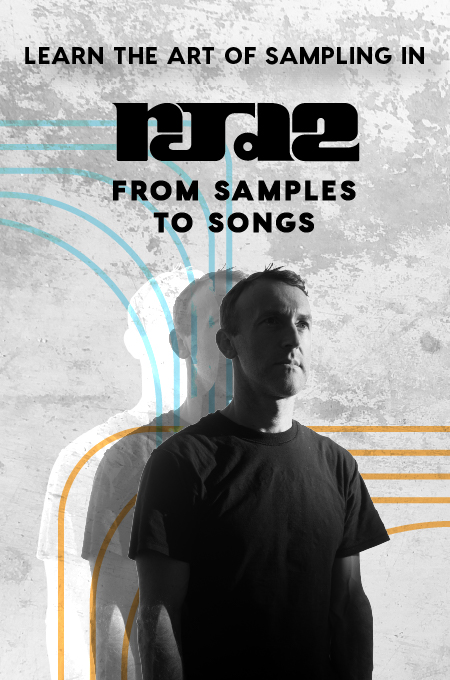+ Ryan Lott (of Son Lux) teaches how to build custom virtual instruments for sound design and scoring in Designing Sample-Based Instruments.
So, you’ve made a little scratch from music; excellent! That could be from actual royalties, say from airplay or streaming, or it could be revenue from playing live or selling merch.
Whatever it is, however much it is, you don’t want to spend it all on hats, jewelry, and Jager bombs. Instead, if you want to grow your music endeavor, you need to put some of it back into the business.
Here are five ways you can reinvest your royalties (or other music income) in order to contribute to the incremental growth of your music career and business. Are you ready? Let’s go!
1. Professional Development
One of the best ways to grow as a music business is to grow as a musician. You can learn a whole lot on your own and through free resources, but you’d be surprised how you can come in a short time by doing something as simple as taking a full online course on production or working 1-on-1 with a personal coach.
Once you have a little money to spend, look first to how you might use it to level up your weaker skills and blind spots, quick.
2. Product Development
Once you start gaining fans and recognition, you need to keep making stuff to offer. That means developing new products, both music and merch. Let’s start with that first one, which is probably the first thing you might think about anyway if you’ve got some new money lining your pockets: the recording studio.
You can use saved up income to invest in your next record — whether that means renting a studio and hiring an engineer to record, or just professionally mixing your home recordings — or use it to create and buy a new line of shirts, a repressing of a recording on vinyl, or some other commercial product that can eventually turn into sustainable passive income.
You might also consider spending a little on a great designer or some session musicians to level up the quality of recordings already in progress. All of these possibilities fall under the category “product development” — developing and implementing new things to sell.
+ Read more on Flypaper: “Know Your Rights: A Simple Guide to Digital Royalties.”
3. Studio Upgrades
If you’ve got a home studio and your process is mostly about producing from there, it pays to make sure you’ve got your space and acoustics squared away. This is a great place to reinvest, because if you make the right purchases you can speed up your workflow, improve your final output, and even jump start your creativity.
Just be careful that you don’t get caught in the studio purchasing black hole, buying up everything every company says you need. Instead, look at your process over the last year, and notice what you wished you’d had, or the problems you ran into.
- Are you finding the mouse and keyboard too slow in the mix? Maybe a DAW controller with faders would speed you up.
- Or maybe you’re a pianist working on a MIDI controller without the proper 88 keys.
- If you’re a guitarist, stop it. You already have too many guitars — try the next item.
4. Promotion to Further Growth
Promotion in the music industry is always hard. It’s especially hard to beat the streets and do it for free. So, the next great place to invest is in promotion. However, beware: not all promotional spend is effective or smart. For example, you can spend a lot of dough on a PR agent and find yourself with no press placements and no return on investment.
So, instead of throwing good money after bad, make a solid plan for how you’ll use money to speed up your process. That could mean Facebook ads, hiring a playlist promotor, or buying submission credits. Whatever it is, make sure you do your research and understand what you can expect to gain. To be better empowered in this, look to item number one above. Learn how to spend wisely, and then put together your promotional budget.
+ Read more on Flypaper: “How and Why to Create a “Radio Edit” Version of Your Single.”
5. Professional Services and Automation
This last category is broad. In summary, what we mean here is see if there’s anything you need to do — whether consistently or one-time — for your business that makes your life difficult. Either you’re not good at that thing or you just can’t make time, and it’s hurting your business to not get it done. Money is the way to get those things taken care of, so here’s a great place to reinvest.
You could hire a graphic designer if you think your future album covers could be better (also counts as product development). You could hire a virtual assistant to do the busy work of submitting tracks to curators. You could get your taxes done properly for once (which may reveal deductions you didn’t know about). If you’re really flush, you could hire a business manager to keep all this crap in order so you can concentrate solely on music.
You could also reinvest in automations to make your online life easier. For example, Zapier makes a ton of automations available, from keeping track of customer lists to sending “Thank Yous” — you name it. Just don’t pay for automations you can already get for free.
And in general, remember this rule of thumb, courtesy of Tim Ferris’s The Four Hour Work Week: “Don’t delegate what you can automate, and don’t automate what you can eliminate.”
It’s great news you finally made some money! It’s even better if it helps you make more! And by the way, you can use these tips to guide you in investing in your music business even if the money is still coming from somewhere else. Have fun spending money, baby!
Don’t stop here!
Continue learning with hundreds of lessons on songwriting, mixing, recording and production, composing, beat making, and more on Soundfly, with artist-led courses by Kimbra, Jlin, Kiefer, RJD2, Ryan Lott, and of course, Com Truise: Mid-Fi Synthwave Slow-Motion Funk.





